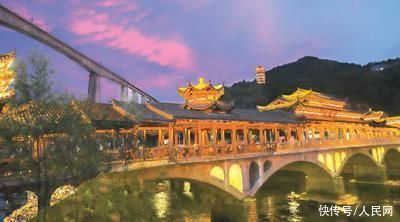Source: People’s Daily Online – People’s Daily Overseas Edition

The Fuxing Covered Bridge echoes the Seven Stars Pagoda.
The Qixing River is located in the upper reaches of the Minjiang River. It is the mother river of Zhenghe County in Fujian Province, and contains unique and profound cultural genes. Zhenghe County was the first place where the Zhu family entered Fujian.
The rippling Qixing River, like a clear jade belt, meanders through the county seat. Standing at the head of the Shuangting Bridge, overlooking Qinglong Mountain, the magnificent Yungen Academy is hidden among the green pines and cypresses. Yungen Academy was built by Zhu Song, where Zhu Xi studied in his childhood, and visited and gave lectures many times as an adult.
In the early morning of summer, the Qixing River at the foot of Yungen Academy Mountain is dreamy and beautiful. A thin layer of water mist rises on the shore, wild ducks swim on the river, and water birds fly in the air. On the banks of the river, green mountains and white mists are soft, ups and downs, which are intoxicating.
Walking along the riverside plank road to the bridgehead of Guanhu Village, you will come across a seven-star pagoda, which is a seven-story octagonal stone hollow pagoda. According to legend, there is a cast iron calf buried under the base of the tower to suppress the water demon and protect the people from the suffering of floods. Facing the Qixing Pagoda 20 meters away, there is a small stone pagoda called “Qianqing Kunning Pagoda”, which has experienced more than 500 years of ups and downs. In 1436, Wu Ting, the right servant of the Ming Dynasty, resigned from office and returned home. In order to eradicate the flooding in his hometown, he built the Qixing River water conservancy and presided over the construction of the stone pagoda. At the foot of Shita Mountain, there is a Longquan. The spring water trickles out from the crevices under the stacked rocks, and then flows into the two connected rectangular pools at the lower part of the Longquan Pool. Longquan has been silently protecting the villagers.
A mouthful of Longquan relics will benefit the people from the legacy of history, and will be learned from generation to generation. In 2021, the Zhenghe County Water Conservancy Bureau will renovate and green the surrounding of Longquan, planting tree species such as golden willow, red osmanthus, red plum, camphor, and nanmu. The bank slope is covered with carpet turf, and the surrounding of Longquan is built with natural bluestones. The charming Longquan Park.
Nowadays, two stone pagodas and a Longquan spring across the fog of history, watching the development of Zhenghe and guarding the Seven Star River. The changes of the four seasons, the changes of the years, and the advancement of the “River and Lake Chief System” have made the Qixinghe cleaner, extraordinarily quiet and beautiful, extraordinarily moving, and extraordinarily ecstatic.
Twilight and sunset, on the Qixing River, the rays of the sun are pouring out, it is quiet and without turbulence, like silk like a mirror, and the spirit is clear and beautiful. Walking on the bluestone slabs, the Julong Covered Bridge with carved beams and painted buildings, the Rainbow Bridge flying across the river bank, the Seven Star Covered Bridge connecting the ancients and the present, the towering Fuxing Covered Bridge… The covered bridges contain historical context and carry the mountain city. The memory of the mountain is connected with the landscape essence of the mountain city, becoming a representative space and iconic carrier, and an ideal bridge for people to cultivate and wash their minds.
The night is sultry, and the river is full of brilliance and dynamism and vitality, filled with the romantic atmosphere of youth. Although the weather is hot, it can’t stop people from walking along the riverside trail. The children happily carried bottles and jars, fished for shrimps by the river and the beach, chased dragonflies, and pursued childlike fun. There was music on the beach square, and the cheerful square dance attracted passers-by to stop and watch. The old man was unmoved when he was fishing, he had nothing else to focus on, he was looking forward to the “big fish” taking the bait, and he felt his own happiness in the process of flicking, mentioning, and pulling. “The Analects of Confucius Yongye” records what Confucius said: “The wise man is happy with water, and the benevolent is happy in the mountains. The wise man is active, the benevolent is quiet. The wise man is happy, and the benevolent man is longevity.” It is like water, so water is happy; the benevolent is content with righteousness and unwavering, and it is similar to mountains, so mountains are happy.” From this, we can experience rich philosophy of life.
Qixinghe’s “sweet charm” and “ecological appearance” are often accompanied by the people here, making the county town that sleeps on the pillow full of quiet and elegant temperament; let the villagers who enjoy a peaceful and leisurely state of mind exclusively And passers-by, live in the Qixing River that nourishes one side, just as Lao Tzu said in the “Tao Te Ching”: “The highest good is like water, and water is good for all things without fighting, and it treats what everyone hates, so it is almost Tao.” It flows slowly, nurturing and infiltrating this land silently, guarding the beauty of the world here and the peace of the years.